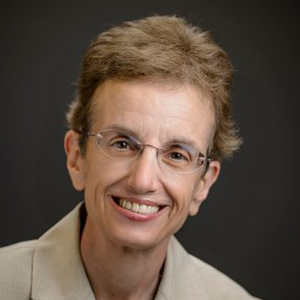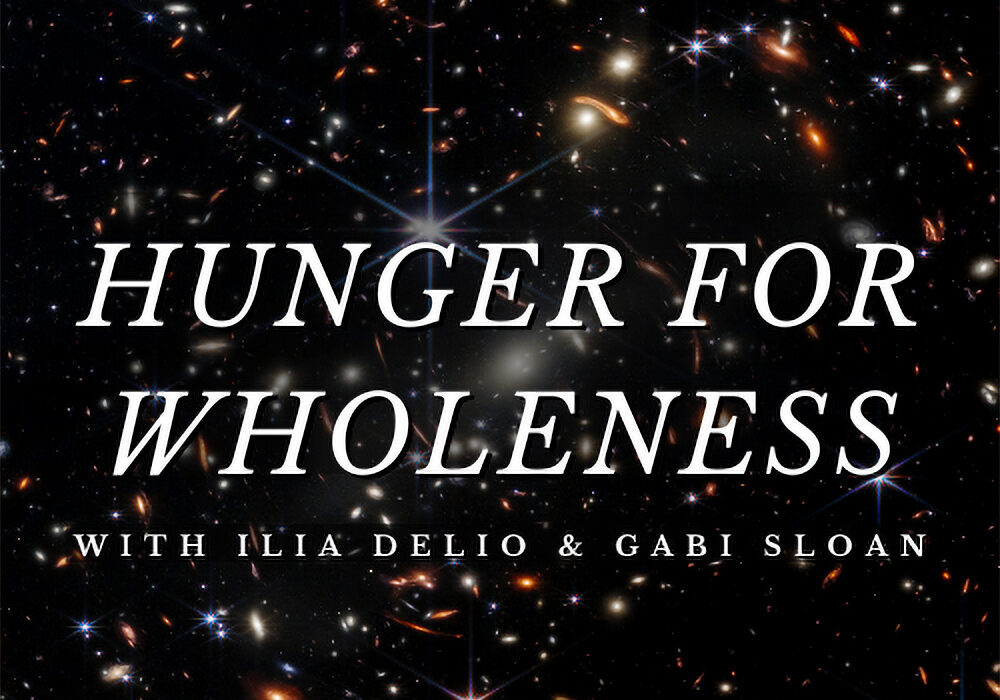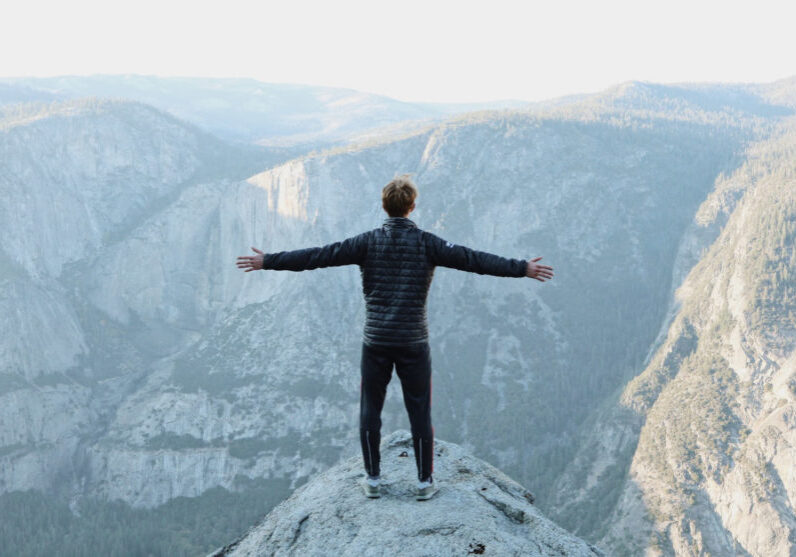Changes in the Church: Momentary Crises or a New Epoch of Consciousness?
Q: Can you help readers/viewers come to an appreciation for just how the institutions, no matter which one, are holding us all back? It is a matter of story–more of Thomas Berry. While I appreciate contemplation, which is most definitely needed, action is a must especially in this planetary crisis in which we live. Thomas Berry writes about the essential things. Are all institutions preparing us for the essential things? How do we move forward in a mutually enhancing way?
 Ilia: Our question this week is on the crisis of institutions, especially those institutions which no longer function to empower and support human life and community. Well I do not think it is a great secret to say that the Catholic Church is an institution in crisis but so too are some of the Protestant denominations such as the Southern Methodists, Evangelical Baptists and those struggling to hold on to biblical beliefs in an accelerating world of change and complexity. The media has certainly done its fair share of diagnosing the ills of our problematic institutions, but I do not think we have yet gotten to the heart of the matter. After recently completing a book called “Re-Enchanting the Earth: Why AI Needs Religion,” I began to realize that the age of the institution may be drawing to a close. This may seem incredible and our first fearful response will be, “what will take its place?” To help allay these fears we must step back and take a panoramic view of the evolutionary trajectory.
Ilia: Our question this week is on the crisis of institutions, especially those institutions which no longer function to empower and support human life and community. Well I do not think it is a great secret to say that the Catholic Church is an institution in crisis but so too are some of the Protestant denominations such as the Southern Methodists, Evangelical Baptists and those struggling to hold on to biblical beliefs in an accelerating world of change and complexity. The media has certainly done its fair share of diagnosing the ills of our problematic institutions, but I do not think we have yet gotten to the heart of the matter. After recently completing a book called “Re-Enchanting the Earth: Why AI Needs Religion,” I began to realize that the age of the institution may be drawing to a close. This may seem incredible and our first fearful response will be, “what will take its place?” To help allay these fears we must step back and take a panoramic view of the evolutionary trajectory.
One of our huge stumbling blocks is that we think in terms that are static and fixed, as if institutions have always prevailed. It is just not so. The institution arose over time during a certain period of human existence known as the axial period. This period slowly emerged several thousand years ago, probably between 800 and 200 BCE but perhaps before. The axial period is an epoch of change, where human consciousness around the globe shifted from the tribe to the individual; from the collective whole to the historical particular. The axial period is the period in evolution when the human person as autonomous and independent arose with a sense of divine transcendence. It is the age of thought in which philosophy, theology, economics, politics and the institutions to safeguard the treasures of wisdom, knowledge and spiritual awareness emerged. The Catholic Church holds a profound place during this period. The Church as an institution was formed in the first five centuries after the death and resurrection of Jesus, based on the experience of those who knew Jesus and by the communities of disciples who recorded the events of his life, death and resurrection and passed them on. Politics played a significant role in consolidating the Church as an institution primarily because the emperor Constantine sought unilateral power in the East and West and used Christianity to bolster his political power. The Church as institution was initially a product of the empire and has a long history of papacy, hierarchy and the relationship between politics and religion.
Our fundamental problem today is that we insist on thinking in static, fixed and historical terms. We do so because we are completely out of touch with nature and the inherent plasticity of nature to change. We have not accepted the basic insights of modern science and treat science as an elite specialty, not as knowledge that is fundamental to our existence. This is a problem not just of the Church but of science itself, established in the modern period as an elite cadre, a select royal priesthood of nature that speaks in languages foreign to the everyday ear. Hence the institution of science has also failed us by not offering ongoing science education, just as we need ongoing faith formation. What does the everyday person know about evolution? Probably not much. Is it important to know the basic features of evolution? Absolutely. It is as important to know the main features of evolution and quantum physics as it is to know God because to believe in God is to believe in the ways God works, and what science tells us is that God works in and through change and complexity. We have no operative understanding of God working in a world of change because we continue to interpret the events of God as historical and static. And this, in my view, is a grave pastoral injustice to the people of God. Yes, the institutions have failed us.
So what do we do? Thomas Berry rightly said that we need a new story because human life is governed by stories, myths and rituals. This is the impetus for my theological work and the work of the Omega Center, to tell a new story through the vision of Teilhard de Chardin. And it is really a new story. Evolution has accelerated in the 20th century primarily because of computer technology and the networked globe. Consciousness is undergoing a radical shift, away from the individual of the first axial period and toward a hyperconnected, electronically-mediated person in the new period we find ourselves in, the “Second Axial Period.” We are moving out of the biological species, homo sapien sapiens, toward a new machine hybridized species that can be called techno sapien. Younger generations are not representative of the autonomous liberal subject which is drawing to a close with the baby boomer generation, but a new type of person; the posthuman is on the rise.
The term “posthuman” relates to the fact that computer technology is our fastest evolver today. It signifies a dynamic partnership between humans and intelligent machines, replacing the liberal humanist subject’s manifest destiny to dominate and control nature. The fragility of boundaries and the recursive loop of identity construction means that no category can ontologically define personhood; rather self is an ongoing dynamical process. Posthumanism, seen through the lens of critical feminists, describes technology as the breakdown of boundaries, the fusion of disparate identities and the forging of a new type of person electronically embedded in systems of information, including the systems of ecology, economics and politics. Posthumanism owes its very expression to a fundamental paradigmatic shift in the nature of scientific realism today.
Teilhard called the new level of electronically-linked minds, the “noosphere,” and now we see that the distributed cognition of the human subject correlates with the distributed cognitive system as a whole electronic environment, in which “thinking” is done by both human and nonhuman actors. Teilhard’s vision of the Noosphere and his concept of the “ultrahuman” is aligned with posthumanism in so far as he too grasped a deep relationality of complexified life, whereby boundaries are transcended as new entities emerge. In his “Building the Earth” Teilhard wrote:
There is now incontrovertible evidence that mankind has just entered upon the greater period of change the world has ever known. The ills from which we are suffering have had their seat in the very foundations of human thought. But today something is happening to the whole structure of human consciousness. A fresh kind of life is starting.
Katherine Hayles helps us understand Teilhard’s notion of the Noosphere and the electronic linking of minds leading to “hyperpersonalization.” Biology belongs to a larger emergent property of living systems which now includes technology. In her brilliant book “How I Became Posthuman” Hayles writes:
The posthuman is likely to be seen as antihuman because it envisions the conscious mind as a small subsystem running its program of self-construction and self-assurance while remaining ignorant of the actual dynamics of complex systems. But the posthuman does not really mean the end of humanity. It signals instead the end of a certain conception of the human, a conception that may have applied at best to that fraction of humanity who had the wealth, power and leisure to conceptualize themselves as autonomous beings exercising their will through individual agency and choice.[i]
As we move from the liberal subject to the posthuman, individual constraints are yielding to a new set of constraints across local boundaries of personal identity. Hayles suggests the possibility of a new humanism developed directly at the borderline of simulation and materiality. In her perspective, the scientific language of complexity theory—dissipative structures, fluidities, porous boundaries, and bifurcations—is projected beyond the boundaries of scientific debate to become the constitutive principles of a form of humanism enabled by the regime of computation. Here the grammar of the body is shifted from exclusive concern with questions of sexual normativity and gendered identity to a creative interrogation of what happens to questions of consciousness, sexuality, power, and culture in a computational culture in which the code moves aggressively from the visible to the invisible, from a history of prosthetics external to the body to a language of simulation fully internal to identity formation. The body of the future is refashioned by distributed consciousness, augmented by extended cognition and circulated through fast-moving, recursive loops of information; always caught up in multicausal, multiagent networks of information, never constrained by the causal but motivated by recombinant possibilities.
Teilhard saw the emerging human person not at the end of evolution but the beginning of what evolution is really about, the rise of complexified consciousness and unity: “We may have supposed that the human species had already reached the limit of its development. Now we see that it is still in an embryonic state.” Technology is accelerating evolution but the totalization of the noosphere, that is, planetized consciousness, lies ahead of humankind. In his view, we are still on the obscure fringe of the ultrahuman.[ii] We have settled into a particular understanding of human personhood and technology seems like a helpful tool for us. However, what is really happening is the emergence of a new type of person in and with technology, and this new person will continue to develop in all aspects of planetary life through an integration of consciousness. He wrote:
A great many of our contemporaries, perhaps the majority, still regard the technico-cultural knitting together of human society as a sort of parabiological epiphenomenon very inferior in organic value to other combinations achieved on the molecular or cellular scale by the forces of Life. . .nothing is more wrong than to treat the Human as though it has been biologically stationary since the ending of the Ice Age. . . what an extraordinary and irreversible increase of collective consciousness is manifest in the growth, association and opposition of techniques, visions, passions and ideas! What an intensification of reflective life!
The basic problem is, we do not think in terms of evolution and this is a fundamental problem today. We must shift our thinking from what is to what is becoming. Our preoccupation with failing institutions diverts, if not thwarts, our attention from taking hold of what is actually taking place before our eyes—our own evolution!
If we are only seeking to survive, Teilhard states, then we are in a closed system that will dissipate. Without a collective commitment to the future, the process of evolution could ultimately collapse in on itself and result in cosmic death. Teilhard was a theologian of second axial consciousness. While first axial religion was individual and other-worldly; second axial religion is collective and planetary: “No longer simply a religion of individuals and of heaven, but a religion of mankind and of the earth—that is what we are looking for at this moment, as the oxygen without which we cannot breathe,” Teilhard wrote.[iii] What he realized is that a new spirit of the earth needs a new whole, a new religious consciousness, born out of the wisdom of the past but refashioned for the electronically convergent future. Computer technology has opened up a new level of convergence unlike any other in human history, the level of converging minds in the noosphere: “We should consider inter-thinking humanity as a new type of organism whose destiny it is to realize new possibilities for evolving life on this planet.” A new axial religious consciousness calls for a new understanding of God consonant with evolution.
God does new things – this is the heart of the New Testament. We have become frozen in our stories, historically fixed in our problems and we fail to see the work of the Spirit breathing new life in our midst. We are at the beginning of a significant global shift that will affect religion, politics, economic and socialization. We are leaving the First Axial period and entering into the Second Axial period. The emptying out of the churches is not the end of religion but a new birth of religion. In our own time, Teilhard said, religion has shrunk because we have made it a personal matter and have limited it to personal salvation. He anticipated the need for a new type of religion, given the forces of evolution and the emergence of the Noosphere. He spoke of a new “religion of the earth,” a collective unity of minds gathered into new forces of love. This emerging religion of the earth is the revolution in our midst.
Quite honestly, I think we are wasting our time and talents by trying to fix a broken-down institution, diagnosing the Church to death. If we want to be Christian, then to truly love is to let go: God empties Godself of divine power to become God for us (cf. Phil 2:6). We must do the same. Focus on the power of God who is within and ahead, be attentive to what the Spirit is calling us to, be ready to change and to enter into new structures of relationship. There is no “story” out there – we are the story as it unfolds through our lives. It is time to stop relying on the institution and to become the vanguard of the new world.
Notes:
[i] Hayles, How I Became Posthuman, 286.
[ii] Teilhard de Chardin, “From the Pre-Human to the Ultra-human: The Phases of a Living Planet.” Almanaches de Science( 1951). https://www.organism.earth/library/document/199
[iii] Teilhard de Chardin, Activation of Energy, 240.
 View print-friendly version
View print-friendly version
8 Comments
Related Posts

Hunger for Wholeness Podcast Launches!
Story matters. Our lives are shaped around immersive, powerful stories that thrive at the heart of our religious traditions, scientific inquiries, and cultural landscapes. All stories – big and small…


Hi Ilia
I am enjoying reading your books and articles – right time and right place for me! Also looking forward to your conference with Catholic Secondary Principals in Victoria Australia next year.
You may have read the recent interview in the Tablet with Francis I and his comments about the role of the institution ie it has been a long Christian understanding that charism eventually needs to be institutionalized if it is to be sustained. ‘Reformans reformandem’ certainly but otherwise the charism will eventually wither or morph into something life denying – this is true of your own Franciscan charism etc.
I am not sure I agree with your equating liberal humanism with the institution of the Christian church. Indeed I would have thought that at its best the church has challenged liberal humanism as it has other defective models eg unbridled capitalism. Given the ancient sacramental tradition of partaking in the paschal mystery ie offertorio, consecratatio, communio, I would have thought the paradigm of the relational centre in the best understanding of the church would remain relevant as we continue to evolve into a cosmic relatedness eg Body of Christ etc…
Do not the Christian understandings, contained in the institution’s understanding of the Tradition: divinization, sanctification, the eschatological Christ breaking through into the present and calling us onwards… align nicely with your insights and provide an ongoing basis for the continued evolution of the church as institution.
Of course this would involve an evolution of the role of magisterium, hierarchy…… and getting women the serious levels of leadership in the Catholic church should be the first cab off the rank.
Cheers
Chris
A question for you, Ilia. I Take delight in much of your writing. I also wonder how we avoid the trap the institutional church fell into by controlling human being through murder, shaming and shunning etc.
I see the computer as a tremendous format for learning and even transformation. Yet there are people who have and would use it as a tool of the destruction of Democracy. How do we prevent ourselves from falling into the same controlling trap as the First Axial age religions.
How do we hold the value of Religion’s past yet create communities of deeper Spirituality.
Jen-Beth
After reading your article I wonder if it is right for me to continue supporting my Episcopal parish that is mounting a capital campaign to raise funds to fix the leaking g roof and beautify the interior, or give my money directly to the poor and homeless?
I think the Hayles book is “How We Became Posthuman”, not “How I Became Posthuman”.
Wonderful and breathtaking
I was wondering of the possibility of translating some of your well done work into my native language ,the portuguese language.Let me know if you so are inclined .Maria Julia Ruggier
This gives me peace and hope re two of my children have left the church due the chaffing from church structures
Take very good care of yourself Ilia, your prophesy is precious trickling water into thirsty anticipating souls. Thank you.